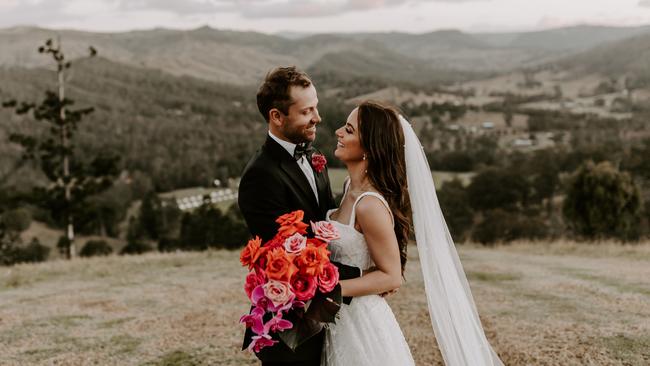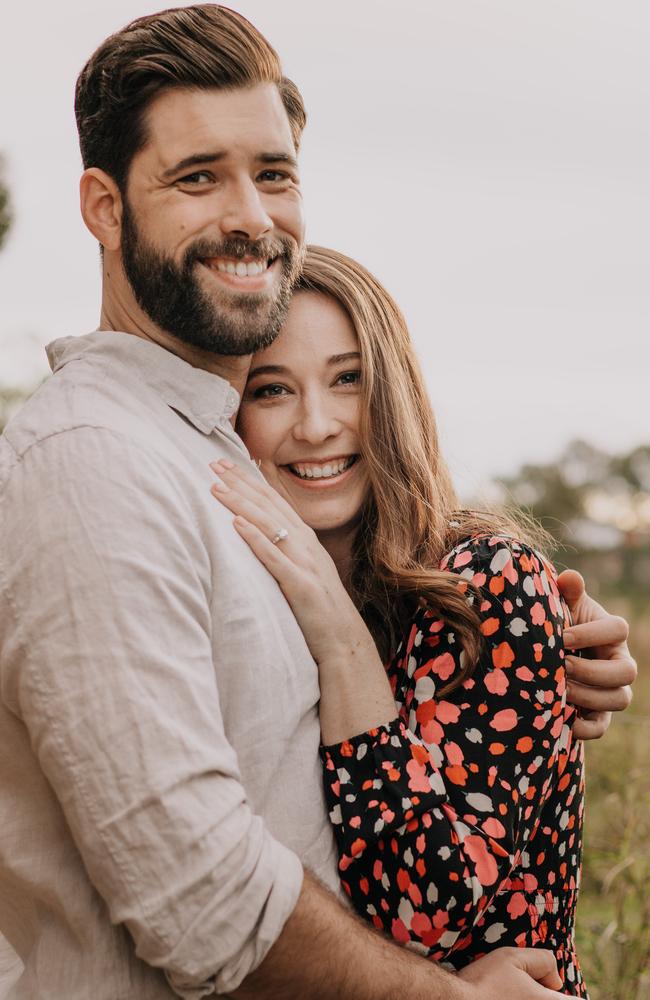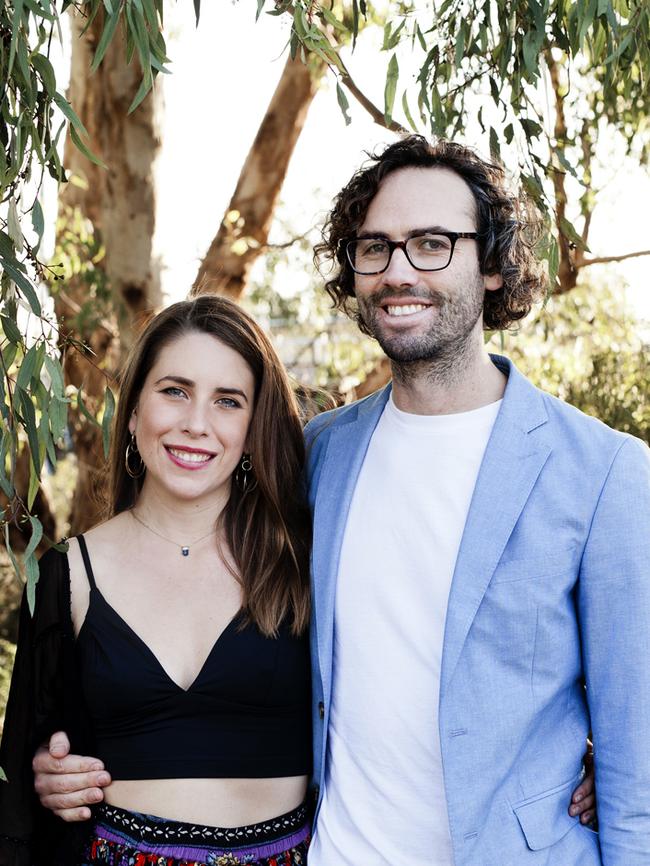350,000 soulmates: Who you marry should be based on science... not lust
Choosing your partner is the biggest decision of your life but it’s not enough to just be in love. Queensland relationship experts have revealed the best way to avoid divorce.
QWeekend
Don't miss out on the headlines from QWeekend. Followed categories will be added to My News.
You look across a crowded room and bam! It hits you with the force of 1000 electric sparks. That flash of attraction, the instant chemistry. It’s love at first sight. This is “the one’’ you’ve been waiting for, your one true love, your soulmate, your romantic destiny. You fall hopelessly, helplessly in love.
If this is a dream you entertain, if this is what you are waiting patiently to find, chances are you have been watching too many movies. Hollywood loves to peddle a good destined-to-be-together love story.
But given the divorce rate – it’s more than 40 per cent in much of the world – it takes more than heart-fluttering romance to make a union last.
Love, it turns out, is not enough.
Extraordinary story of family of secret agents living in suburban Brisbane
‘Being told I would die made me live’: Three incredible tales of survival
Brisbane psychiatrist and relationships specialist Dr George Blair-West believes we can do better at choosing our life partners by making more informed, conscious decisions. Choosing who to spend the rest of your life with and/or who will be the other parent of your children, is, after all, the biggest decision of our lives.
Blair-West, 60, a private practice psychiatrist with 25 years’ experience, says we often put more thought into the longevity of material purchases than choosing who will be our life partner and believes people are capable of having more power over their relationship destiny.
Teaming up with his millennial dating coach daughter Jiveny Blair-West, 30, he has written a book, titled How to Make the Biggest Decision of Your Life, about unlocking “the secrets to a healthy and lasting relationship” and how to best choose a lifelong partner.

At the heart of the book is his belief that we can spot potential trouble ahead while we are still dating; that prevention is better than cure. Every big problem, Blair-West says, was a small problem once. And divorce is a big, messy problem.
Australian Bureau of Statistics show there were 113,815 marriages registered in 2019 and 49,116 divorces granted. The crude divorce rate in 2019 was 1.9 per 1000 estimated resident population – a decrease over time from 2.8 divorces granted per 1000 persons in 1999.
Blair-West, who has been married to his psychologist wife Penny, 60, for 33 years, has previously authored three books on other topics (including the best-selling Weight Loss for Food Lovers) and sees his most important work as preventing divorce by helping people to find “enduring love’’.
His 2017 TED talk, titled “Three ways to build a happy marriage and avoid divorce”, registered more than 3.5 million views.

He believes Generation Y – millennials – who are now in their twenties and early 30s, have grown up in a “divorce-ready’’ culture where divorce is normal. Familiar with the heartache of marriage failure, millennials have also grown up connected to information – they are quick to jump online and research topics.
“Baby boomers and Gen X are the first generations to start to experience divorce but they still have this romantic destiny view of relationships – we find the one, we stumble across them, the sparks ignite and the relationship follows. It’s a magical process,’’ Blair-West says.
“Millennials see this completely differently … they are two generations into a divorce-ready culture. Everyone they know has been touched by divorce at some level and they don’t buy this idea that you just meet someone, start a relationship and have a happy ever after.
“Millennials more readily access information and question the quality of the information they look up.’’
He writes: “This generation is changing our culture at a fundamental level. When it comes to relationships, I believe it will be for the better.
“It is an exciting possibility that the present generation of ‘about-to-become parents’ could be more open to preventing divorce than any generation before them.’’
So how to make a good life partner choice? Firstly, don’t be in a rush.
Blair-West recommends a minimum of three years between meeting and having children for those aged 25 and under, with these times roughly halved for those aged 30 and above.
Part of this is physiological – your brain is still evolving up to the age of 25 – and part is simply that it takes time to really get to know someone and work out if your life values and vision align.
The dating phase is a time for “evaluation and discovery’’. This is when the big issues – like whether having children is on the agenda – should be ironed out. Other values to work through may include work/leisure balance,
religion/spirituality, political attitudes, parenting values, travel, education and learning and even where you want to live.
Personalities are also settling into place. Who you are in your early twenties is unlikely to correlate with the person you become in your fifties.
“Love is not enough,’’ Blair-West says. “If you don’t have a shared vision and aligned values but you are in love, that doesn’t mean the relationship is going to survive. In fact, that’s how a lot of relationships got into a mess in the first place because they thought love would carry them through and it doesn’t.
“One of the critical points for having a successful marriage and avoiding divorce is how much you are looking down the track.
“Many people think you don’t choose your partner, that it’s not a cognitive process. But you have to start thinking about these things and discussing these issues, otherwise they become a major conflict down the track.’’

And time, he says, is “the ultimate truth serum’’ where all sorts of quirks, issues and shortcomings – such as a tendency to anger, to drink too much, to avoid conflict – will be inexorably drawn out and put on display.
“Getting married in your late 20s and early 30s is the ideal age,’’ Blair-West says.
“When I hear couples who married very young say they have grown apart, they have literally grown apart – their brains and personalities grew in different directions and 10 years later they weren’t the same person they married.’’
A 2017 Marriage Report out of the UK surveyed 4000 recently married couples and found the average couple was in a relationship for 4.9 years before getting married.
The total average time living together before marriage was 3.5 years.
Blair-West says divorce rates in the UK are currently at their lowest in 50 years “and this extended courtship is one of the reasons why’’.
Another important trait for couples to establish is “influenceability’’ – a couple’s willingness to respect each other’s opinions and allow them to be influenced by each other for the good of the relationship.
“You don’t have a right to change your partner but you have a responsibility to tell them what it is that you need for a relationship to work for you,’’ Blair-West says
“Whether each person continues the relationship or not is up to them but you are making an informed decision.
“Of course romance has to be there – romance is a grand and beautiful and quirky thing. But we need to add to a romantic, loving heart, an informed, thoughtful mind as we make the most important decision of our life. It’s bringing our head in with our heart here.’’
Brisbane couple Tom and Alex Farmer married in September last year after dating for five years.
Before tying the knot before 100 family and friends at Canungra, in Queensland’s Scenic Rim, Tom, 30, an agronomist, and Alex, 28, a speech pathologist, spoke to each other extensively about the “big issues’’.
“We definitely spoke about having children and we are both on the same page,” Tom says. “As an agronomist, my work is also generally rurally based so we also had to talk about where we might live and, early on, we had conversations about that. It was important to keep those lines of communication open so we both knew where we stood with those sorts of things. There needs to be some flexibility, understanding and compromise both ways.’’

Next month, the couple plans to move to Bundaberg for Tom’s work. It follows Alex working away from Brisbane for a time when Tom was still studying.
“When we first got together, Tom was in Brisbane studying a masters and then he started his own business,’’ Alex says.
“After working in Brisbane for a while, I did some contracting work in Roma and Mount Isa, and Tom was very supportive and happy for me to do that for about six months while he stayed in Brisbane. We have been open and flexible with each other. In our years together, we have worked out we want to stay adventurous, to keep the adventure alive, challenging ourselves, exploring Australia and picking up new hobbies. We’d like to do a motorbiking adventure holiday off the beaten track, for example.
“At the end of the day, a relationship is not going to work long term if a person doesn’t have qualities like loyalty, reliability and dependability. Tom is very much the sort of person who does what he says he is going to do.
“In terms of shared values like having children, where we might want or not want to live, what we want to achieve … for Tom and I, all those things aligned really easily.’’
Veronica Eggleton, 32, and Ben Allen, 31, plan to marry in March after postponing their November wedding due to COVID-19.
Eggleton, a Network Ten sports journalist and Allen, director of aquatics at Anglican Church Grammar School (Churchie), began dating in October 2017 after Allen messaged Eggleton on Instagram. They moved in together after about six months and were engaged in June 2019, on Allen’s 30th birthday.
Eggleton says she is aware of how she has changed from her early 20s.

“I certainly see the value in knowing more who you are as you get older,’’ she says.
“I think about who I was in my early 20s, compared to who I am in my early 30s and I’m probably a very different person.
“As I got older, into my mid to late twenties, my list of what I was looking for in a partner became much more specific.
“The whole typical tall, dark and handsome – even though Ben is that – transitioned to more qualities that I was looking for.
“Ben’s kindness was really appealing to me, rather than the superficial stuff that you may be more focused on when you are younger. I wanted someone who was very genuine and invested in the relationship. Straight up, from day one, I knew that Ben was in this with me so that was a really appealing thing.’’
Eggleton says they established shared values, such as having a family, in the early stages of their relationship. “Every love story has its own tale and different people want different things and that’s completely fine,’’ she says. “But if (having kids) is something you don’t agree on, it’s obviously a deal breaker.
“As you get older, if you are not on the same page, then you don’t want to waste each other’s time, as brutal as that sounds.
“Ben and I had so many of those big conversations early on and that’s what we built on.
“It was also good for us to live together. It’s very different from dating someone and you certainly find out quickly who they are. Luckily for us, it worked.’’
As a dating and attraction coach, Jiveny Blair-West works online with single clients to help them get into relationships.
Jiveny, 30, of Buderim, on the Sunshine Coast, is herself engaged to be married in March, after having her April 2020 wedding postponed.
She met her fiance, Joe Oppenheimer, 34, a musician who is also studying a masters in environmental management, on a tram in Melbourne. They have been dating for about four years.

“I’d had my heart broken the year before I met Joe,’’ Jiveny says.
“I was definitely understanding that love is not enough and we still need to consider who is going to be most compatible with the life we want to create for ourselves.
“Joe and I had a long courtship period and we really did build our relationship on a friendship first. I knew we had aligned vision and values, he was reliable and that I could trust him, so I felt a lot safer to go all in.
“When we are single, it’s such a wonderful time to get really clear on what our vision is and answer those big-vision questions. Probably the biggest shared vision of all is having kids.
“I have friends who are in relationships knowing that they never want kids but they are in love with their partner and their partner does want kids. That’s very hard to overcome. There’s no real solution for that, which is heartbreaking.
“Sometimes it’s a tough decision to make, especially when feelings are there. But you need to picture your future in the long-term.
“If we want a relationship to last, we need to be thinking about what we value in our lives, what’s important and what our deal breakers are.’’

Jiveny says her millennial peers realise there is no single “the one’’, rather multiple partner possibilities. “In previous generations there has been more of a folklore around finding ‘the one’,’’ she says.
“Millennials are definitely getting married later in life, they are not rushing into it. They know themselves better and there is less stigma in moving in together before you are married.
“Interestingly, it looks like the divorce rate has started to fall so that shift is taking place.
“Falling in love is often viewed as a passive process. Even the word ‘falling’ is a little bit dramatic because it suggests we just need to let gravity do the work.
“So many people go looking for a fire, when all they need is a flame. They go looking for these intense feelings of intoxication and infatuation, and they are often quick to move on if those feelings aren’t there.
“On the first two dates, don’t focus on establishing if a person is a potential life partner, rather on just building a connection. Otherwise it can become a bit like a job interview.
“I also suggest bringing an energy of curiosity and playfulness, and think about how to build love and build a connection, rather than waiting for it to happen.”
George Blair-West believes finding our long-term love is not as hard as we may think.
He quotes research by Harvard University relationships researcher and professor Dr Robert Epstein who estimates there are some 350,000 people in the world we could potentially have a happy marriage with.
Even if you take 99.9 per cent of those people out of the mix because they are already married or don’t live in a suitable area, you are still down to a pool of about 350 people.
“We’re not looking for ‘the one’, we’re looking for ‘the chosen one’,’’ Blair-West says.
“Millennials understand this very readily. The older generations are still very much caught up in the soulmate, finding ‘the one’.’’ And so when Blair-West provides a definition of true love, his “magic word’’ is commitment. He draws on research that shows arranged marriages have the lowest divorce rate. This teaches us, he says, that it’s more about what we build than what we find.
“True love is the feeling of being fully accepted by another, who knows you intimately and who is committed to nurturing both your personal growth and their own,’’ Blair-West says.
“Yes, there should be a romantic attraction but, of the people you can be romantically attracted to, there are some who are better matches.
“We are really choosing who and what principles, what relationship vision, we commit to.
“More than anything else, we are looking for a partner who will match our preparedness to commit. It is way too big a decision to leave to luck.’’
How to Make the Biggest Decision of Your Life by Dr George Blair-West and Jiveny Blair-West, Hachette, $33


